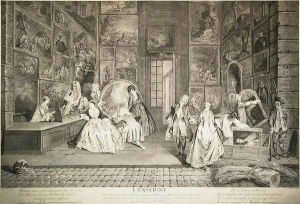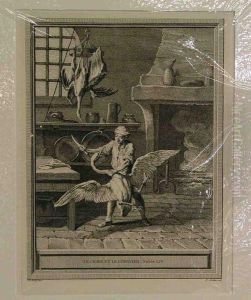Pierre-Alexandre Aveline Paintings
Pierre-Alexandre Aveline, born in 1702 in Paris, France, was a distinguished engraver of the French Rococo period, known for his exquisite craftsmanship and attention to detail. Aveline came from a family deeply embedded in the world of art; his father, Pierre Aveline, was also an accomplished engraver, which provided a fertile ground for his early training and development in the arts. The Aveline family's artistic lineage and connections within the art world of Paris offered Pierre-Alexandre a rich environment to hone his skills and establish his career.
Aveline's work is characterized by its intricate detail and the delicate handling of the engraving tools, which allowed him to produce works of high aesthetic and technical quality. He specialized in reproducing paintings of contemporary and earlier artists, thereby playing a crucial role in disseminating the works of painters to a broader audience. This practice was instrumental in the promotion and preservation of artistic heritage during the 18th century. Among his notable reproductions are those of Watteau's paintings, which he skillfully translated into engravings, capturing the essence and charm of the original works. His talent in rendering the subtle nuances of light and shadow, as well as the textures of fabrics and nature, made his engravings highly sought after by collectors and art enthusiasts of his time.
Throughout his career, Aveline also produced original works, including portraits, landscapes, and genre scenes, showcasing his versatility and creativity as an artist. His contributions to the art world were recognized by his admission into the prestigious Académie Royale de Peinture et de Sculpture, an acknowledgment of his skill and impact on the French engraving scene.
Pierre-Alexandre Aveline's legacy is marked by his mastery of the engraving medium and his role in the cultural transmission of art. His works continue to be studied and appreciated for their beauty and technical excellence, embodying the elegance and refinement of 18th-century French art. Aveline passed away in 1760, leaving behind a body of work that continues to inspire and captivate art lovers and historians alike.

